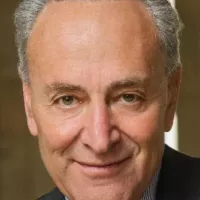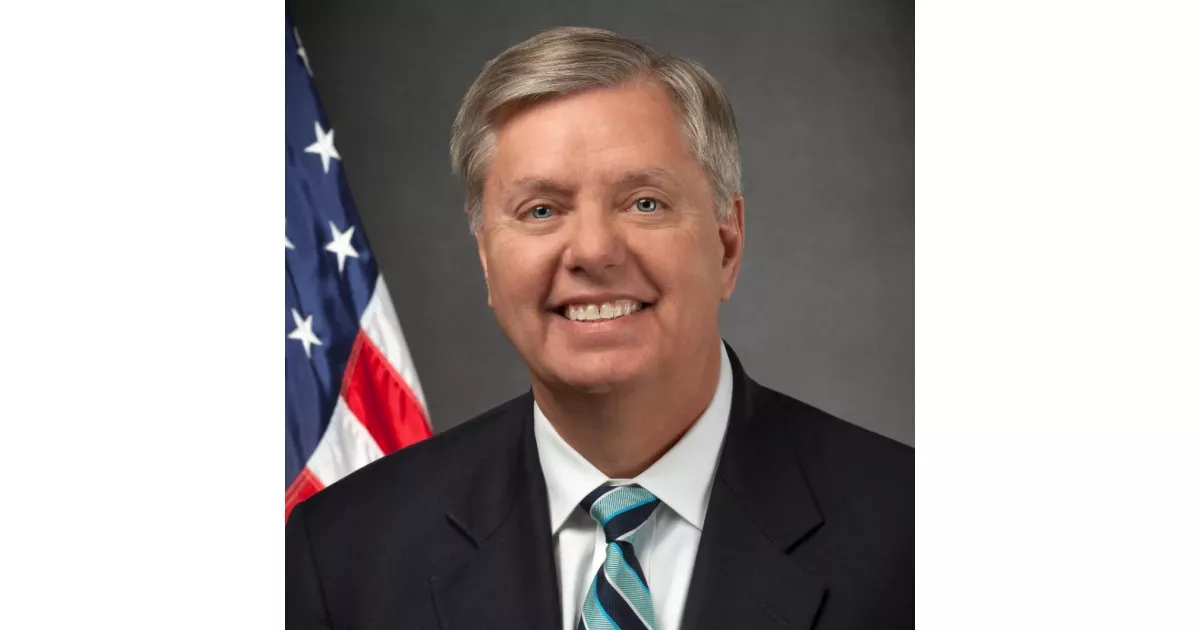How Lindsey Graham built a successful career. Explore key moments that defined the journey.
Lindsey Graham is an American politician and attorney. He has served as a Republican U.S. Senator for South Carolina since 2003. He notably chaired the Senate Judiciary Committee from 2019 to 2021.
3 hours ago : Lindsey Graham Predicts Cuba Next After Iran Strikes, Regime Collapse Imminent
Senator Lindsey Graham suggests Cuba could be the next target after Iran strikes, claiming the Iranian regime is on the verge of collapse, mentioning Trump's influence.
1966: Fritz Hollings became US Senator
In 1966, Fritz Hollings became US Senator for South Carolina.
1982: Joined U.S. Air Force Judge Advocate General's Corps
In 1982, Lindsey Graham became a member of the Judge Advocate General's Corps in the U.S. Air Force.
1982: Commissioned as an officer in the Judge Advocate General's Corps
In 1982, Lindsey Graham was commissioned as an officer in the Judge Advocate General's Corps (JAG Corps) in the United States Air Force and began active duty.
1984: Served as Air Force's chief prosecutor in Europe
From 1984 to 1988, Lindsey Graham was the Air Force's chief prosecutor in Europe, stationed at Rhein-Main Air Base in Frankfurt, Germany. In 1984 he was also featured in an episode of "60 Minutes".
1988: Left Judge Advocate General's Corps
In 1988, Lindsey Graham completed his service in the Judge Advocate General's Corps in the U.S. Air Force.
1988: Returned to South Carolina
In 1988, after his service in Europe, Lindsey Graham returned to South Carolina and served as assistant county attorney for Oconee County. He served as assistant county attorney until 1992.
1989: Left active duty and entered private practice
In 1989, Lindsey Graham left active duty in the Air Force and entered private practice as a lawyer.
1989: Joined South Carolina Air National Guard
In 1989, after leaving the Air Force, Lindsey Graham joined the South Carolina Air National Guard.
1990: Recalled to active duty during Gulf War
During the 1990-1991 Gulf War, Lindsey Graham was recalled to active duty, serving as a judge advocate at McEntire Air National Guard Station in Eastover, South Carolina.
1990: City attorney for Central
In 1990, Lindsey Graham served as city attorney for Central until 1994.
1991: Served as judge advocate during Gulf War
During the 1990-1991 Gulf War, Lindsey Graham was recalled to active duty, serving as a judge advocate at McEntire Air National Guard Station in Eastover, South Carolina.
1992: Elected to South Carolina House of Representatives
In 1992, Lindsey Graham was elected to the South Carolina House of Representatives from the 2nd district, in Oconee County, defeating Democratic incumbent Lowell W. Ross.
1992: End of term as assistant county attorney
In 1992, Lindsey Graham's service as assistant county attorney for Oconee County came to an end.
1993: Began term in South Carolina House of Representatives
In 1993, Lindsey Graham began his term in the South Carolina House of Representatives.
1994: Elected to U.S. Congress
In 1994, Lindsey Graham was elected to the U.S. House of Representatives for South Carolina's 3rd congressional district, succeeding Butler Derrick. He was the first Republican to represent the district since 1877.
1994: End of term as city attorney
In 1994, Lindsey Graham's service as city attorney for Central came to an end.
1995: Joined U.S. Air Force Reserve
In 1995, Lindsey Graham joined the U.S. Air Force Reserve after serving in the South Carolina Air National Guard.
1995: Elected to U.S. House of Representatives
In 1995, Lindsey Graham was elected to the U.S. House of Representatives, representing South Carolina's 3rd congressional district.
1995: End of term in South Carolina House of Representatives
In 1995, Lindsey Graham's term in the South Carolina House of Representatives concluded.
1996: Voted for the Defense of Marriage Act
In 1996, Lindsey Graham voted in favor of the Defense of Marriage Act (DOMA), which defined marriage as between one man and one woman and disallowed federal recognition of same-sex marriages.
1996: Reelected to U.S. House of Representatives
In 1996, Lindsey Graham was reelected to the U.S. House of Representatives, defeating Debbie Dorn.
1997: Took part in leadership challenge against House Speaker Newt Gingrich
In 1997, Lindsey Graham participated in a leadership challenge against House Speaker Newt Gingrich.
1998: Promoted to lieutenant colonel
In 1998, Lindsey Graham was promoted to the rank of lieutenant colonel.
1998: Reelected to third term unopposed
In 1998, Lindsey Graham was reelected to a third term in the U.S. House of Representatives unopposed.
1998: Graham's statements during Bill Clinton's impeachment referenced
In December 2019, during the impeachment of Donald Trump, Democrats referenced statements Lindsey Graham made during the 1998 impeachment of Bill Clinton, including his citation of Richard Nixon as proof that a president who ignored a subpoena should be impeached.
2000: Graham supports McCain for president
In 2000, Lindsey Graham supported John McCain for president.
2000: Reelected to fourth term
In 2000, Lindsey Graham was reelected to a fourth term in the U.S. House of Representatives, defeating Democratic nominee George Brightharp.
2002: Voted for the Iraq Resolution
In 2002, Lindsey Graham voted in favor of the Iraq Resolution, which authorized military action against Iraq.
2002: Elected to U.S. Senate
In 2002, Lindsey Graham was elected to the U.S. Senate, succeeding Strom Thurmond. He defeated Democratic nominee Alex Sanders. He became South Carolina's first new U.S. senator since Fritz Hollings in 1966.
2003: Became US Senator for South Carolina
In 2003, Lindsey Graham became the senior United States Senator from South Carolina, a position he has held since.
2003: End of term in the U.S. House of Representatives
In 2003, Lindsey Graham's service in the U.S. House of Representatives came to an end.
2004: Promoted to colonel
In 2004, Lindsey Graham was promoted to colonel in the U.S. Air Force Reserve at a White House ceremony officiated by President George W. Bush. A lower court also determined that his service as a military judge while a senator was acceptable.
May 23, 2005: Graham part of Gang of 14 compromise
On May 23, 2005, Graham was part of the Gang of 14 senators who forged a compromise ending the blockage of judicial nominee votes, negating both Democratic filibusters and the Republican "nuclear option".
July 2005: Graham secures release of Guantanamo interrogation memos
In July 2005, Graham secured the declassification and release of memoranda that outlined concerns made by senior military lawyers as early as 2003, regarding the legality of the interrogations of prisoners held at Guantanamo Bay.
November 2005: Graham amendment on detainee rights passes
In November 2005, Graham authored an amendment to a Department of Defense Authorization Act attempting to clarify the authority of American courts regarding detainees. The amendment passed in the Senate despite opposition from human rights groups and legal scholars who contended that it limited the rights of detainees.
February 2006: Graham files amicus brief in Hamdan v. Rumsfeld case
In February 2006, Graham joined Senator Jon Kyl in filing an amicus brief in the Hamdan v. Rumsfeld case, arguing that Congress was aware that the Detainee Treatment Act of 2005 would strip the Supreme Court of jurisdiction to hear cases brought by Guantanamo detainees.
2006: Supported Constitutional Amendment Opposing Same-Sex Marriage
In 2006, Lindsey Graham voted in support of a constitutional amendment opposing marriage between same-sex couples, stating his belief in the traditional definition of marriage and the need to protect it through a constitutional amendment.
2007: Served in Iraq as a reservist
In 2007, Lindsey Graham served in Iraq as a reservist on active duty for a short period in April and for two weeks in August, focusing on detainee and rule-of-law issues.
2007: Advocated for surge strategy in Iraq
In 2007, Lindsey Graham, along with John McCain and Joe Lieberman, widely pushed for American military intervention, particularly after the September 11 attacks, reaching their zenith of influence as President Bush advocated for his surge strategy in Iraq.
2008: Graham wins primary nomination despite immigration stance
In 2008, Graham won the Republican nomination by a large margin despite a primary challenge from Buddy Witherspoon, prompted by conservative activists due to Graham's stance on immigration.
2008: Graham co-chairs McCain's presidential campaign
In 2008, Lindsey Graham served as national co-chair of John McCain's presidential campaign.
2008: Reelected to U.S. Senate
In 2008, Lindsey Graham was reelected to the U.S. Senate, defeating Buddy Witherspoon in the Republican primary and Bob Conley in the general election.
2008: Russia's invasion of Georgian land
In August 2011, Lindsey Graham co-sponsored a resolution that stated that "Russia's invasion of Georgian land in 2008 was an act of aggression, not only to Georgia but to all new democracies."
August 2009: Served as legal advisor in Iraq and Afghanistan
From August 2009 to July 2014, Graham served as a senior legal advisor to the Air Force in Iraq and Afghanistan, overseeing the detention of military prisoners.
August 2009: Served in Afghanistan during Senate recess
In August 2009, Lindsey Graham served in Afghanistan during the Senate recess. He was also assigned as a senior instructor at the Judge Advocate General's School, though he never went.
December 10, 2009: Co-sponsored climate change bill letter
On December 10, 2009, Lindsey Graham, along with senators John Kerry and Joe Lieberman, co-sponsored a letter to President Obama announcing their commitment to passing a climate change bill and outlining its framework.
December 2009: Graham votes against Affordable Care Act
In December 2009, Graham voted against the Affordable Care Act (Obamacare).
June 2010: Changed stance on global warming science
In June 2010, Lindsey Graham told reporters that the science about global warming had changed, expressing skepticism and stating that the whole movement had taken a giant step backward.
November 6, 2010: Called for a preemptive military strike to weaken the Iranian regime
On November 6, 2010, Lindsey Graham called for a preemptive military strike to weaken the Iranian regime.
December 2010: Voted against New Start treaty
In December 2010, Lindsey Graham was one of 26 senators to vote against the ratification of New Start, a nuclear arms reduction treaty between the U.S. and the Russian Federation.
2010: Thornton Law Firm reimbursed political contributions
Between 2010 and 2014, the Thornton Law Firm reimbursed political contributions of its partners.
2010: Graham's immigration reform talks with Schumer break down
In early 2010, Graham began working with Democratic New York senator Chuck Schumer on immigration reform, but the talks broke down later that year.
August 2011: Co-sponsored resolution on Russia's invasion of Georgia
In August 2011, Lindsey Graham co-sponsored a resolution that stated that "Russia's invasion of Georgian land in 2008 was an act of aggression, not only to Georgia but to all new democracies."
2011: Kelly Ayotte joined the group.
In 2011, Kelly Ayotte joined the Senate and was considered Lieberman's replacement in the group of three amigos.
2011: Supported continuing US military presence in Iraq
In 2011, Lindsey Graham supported a continuing U.S. military presence in Iraq, stating that if the U.S. was not "smart enough" to maintain a troop presence, Iraq could "go to hell".
April 2012: Graham endorses Mitt Romney
In April 2012, after Rick Santorum withdrew from the race, Lindsey Graham endorsed Mitt Romney as the presumptive Republican nominee.
June 2012: Graham supports closing tax loopholes
In June 2012, despite signing Grover Norquist's Taxpayer Protection Pledge, Lindsey Graham supported closing tax loopholes without compensating decreases in other tax revenue, citing the country's debt as a reason to compromise on ideological grounds.
2012: Advocated for continuing US military presence in Iraq
In 2012, Lindsey Graham said, "If we're not smart enough to work with the Iraqis to have 10,000 to 15,000 American troops in Iraq in 2012, Iraq could go to hell."
2012: Benghazi attack
On January 29, 2013, Lindsey Graham said that Secretary of State Hillary Clinton "got away with murder" after her testimony about the 2012 Benghazi attack.
January 28, 2013: Graham joins bipartisan group on immigration reform
On January 28, 2013, Graham was a member of a bipartisan group of eight senators that announced principles for comprehensive immigration reform.
January 29, 2013: Criticized Hillary Clinton on Benghazi
On January 29, 2013, Lindsey Graham said that Secretary of State Hillary Clinton "got away with murder" after her testimony about the 2012 Benghazi attack.
February 28, 2013: Criticized Budget Reduction
On February 28, 2013, Lindsey Graham criticized Obama and both political parties on the Senate floor for allowing budget reductions, citing concerns about the impact on the Department of Defense and the creation of a "hollow military".
March 2013: Graham introduces bill to flag individuals with insanity defense for gun purchases
In March 2013, Graham joined other senators in introducing a bill that would close a loophole by flagging people who attempt to buy guns who have used an insanity defense, were ruled dangerous by a court, or had been committed by a court to mental health treatment.
June 23, 2013: Graham says Senate close to 70 votes on immigration reform
On June 23, 2013, Graham stated that the Senate was close to obtaining 70 votes to pass the comprehensive immigration reform package.
July 16, 2013: Suggested US boycott of 2014 Winter Olympics in Sochi
On July 16, 2013, Lindsey Graham suggested that the United States should consider boycotting the 2014 Winter Olympics in Sochi, Russia, due to concerns about the Russian government's actions.
July 25, 2013: Graham amendment on Snowden asylum sanctions adopted
On July 25, 2013, the U.S. Senate Committee on Appropriations unanimously adopted an amendment by Graham to the Fiscal Year 2014 Department of State, Foreign Operations, and Related Programs Appropriations Bill that sought sanctions against any country offering asylum to Edward Snowden.
2013: Influence Declined
In 2013, Lindsey Graham's influence declined shortly before Lieberman retired from the Senate.
July 2014: End of term as legal advisor in Iraq and Afghanistan
Lindsey Graham's service as a senior legal advisor to the Air Force in Iraq and Afghanistan concluded in July 2014.
October 2014: Graham hints at presidential run
During his Senate reelection race in October 2014, Lindsey Graham suggested he might run for president if no one else stepped up to address immigration and foreign policy issues.
2014: Thornton Law Firm reimbursed political contributions
Between 2010 and 2014, the Thornton Law Firm reimbursed political contributions of its partners.
2014: Suggesting a potential US boycott
On July 16, 2013, Lindsey Graham suggested that the United States should consider boycotting the 2014 Winter Olympics in Sochi, Russia, due to concerns about the Russian government's actions.
March 7, 2015: Graham advocates reversal of defense spending cuts
On March 7, 2015, at a "Politics and Pies" forum, Lindsey Graham advocated for the reversal of defense spending cuts and quipped about using the military to keep Congress in town until they fixed the issue if he were President of the United States.
March 2015: Graham supports Saudi-led intervention in Yemen
In March 2015, Lindsey Graham voiced his support for the Saudi Arabian-led intervention in Yemen, emphasizing the strategic partnership with Saudi Arabia against Iran.
April 19, 2015: Graham indicates he is likely to run for president
On April 19, 2015, Lindsey Graham stated he was "91% sure" he would run for president, contingent on his ability to raise the necessary funds.
May 18, 2015: Graham announces he will run for president
On May 18, 2015, Lindsey Graham informally announced his candidacy for President on CBS This Morning, citing his concern that "the world is falling apart."
June 1, 2015: Graham announces presidential candidacy
On June 1, 2015, Lindsey Graham officially announced his candidacy for President of the United States.
June 17, 2015: Graham addresses Charleston church shooting and Confederate flag
After the Charleston church shooting on June 17, 2015, Lindsey Graham addressed the calls to remove the Confederate flag from the South Carolina State Capitol grounds, stating it was time for people in South Carolina to revisit that decision while acknowledging its controversial symbolism, and focused on the shooter's personal responsibility for the crime.
December 21, 2015: Graham suspends presidential campaign
On December 21, 2015, Lindsey Graham suspended his presidential campaign due to lack of support and poor polling.
2015: Reference to the 2015 Conflict
In 2015, Graham and Trump had a conflict, which was later referenced when Graham gave Trump his new phone number in March 2017.
2015: Graham sponsors Pain-Capable Unborn Child Protection Act
In 2015, Graham sponsored the Pain-Capable Unborn Child Protection Act in the Senate, which bans abortion after 20 weeks of gestation on a national basis, with some exceptions.
2015: Retired from the Air Force
In 2015, Lindsey Graham retired from the Air Force at the rank of colonel after over 33 years of service.
2015: Accepted climate change is real
In 2015, Lindsey Graham stated that he "completely understand[s] and accept[s]" that climate change is real, but expressed uncertainty about the role of human activity.
January 15, 2016: Graham endorses Jeb Bush
On January 15, 2016, Lindsey Graham endorsed Jeb Bush for president.
February 2016: Graham calls Trump a 'kook' and 'unfit for office'
In February 2016, Lindsey Graham stated that he thought Donald Trump was a "kook," "crazy," and "unfit for office."
May 2016: Graham refuses to vote for Trump or Clinton
In May 2016, with Donald Trump likely to become the Republican nominee, Lindsey Graham stated he would not vote for Trump or Hillary Clinton.
June 2016: Graham criticizes Trump's remarks about a judge
In June 2016, Lindsey Graham criticized Donald Trump's remarks about a judge of Mexican heritage, stating that Trump was "playing the race card" and that such attacks were "very un-American." He also suggested that people should reconsider their support of the Republican party if Trump continued this line of attack.
November 8, 2016: Graham votes for Evan McMullin
On November 8, 2016, Lindsey Graham announced that he had voted for Evan McMullin.
2016: Presidential Candidacy Announcement
In 2016, Lindsey Graham announced his candidacy for president. His sister, Darline Graham Nordone, introduced him at the announcement and expressed her intention to frequently join him on the campaign trail to showcase his softer side to voters.
2016: Dropped out of 2016 U.S. presidential election
In 2016, Lindsey Graham ran for the Republican nomination in the U.S. presidential election but dropped out before the primaries began.
2016: Graham received funds from Thornton Law Firm
In 2016, it was reported that Lindsey Graham was the only Republican recipient of money from a major Democratic donor, the Thornton Law Firm, and was facing scrutiny for questionable campaign donation habits.
2016: Manbij liberated from ISIS with US-led coalition help
In 2016, the Manbij Military Council, with the help of the US-led coalition, led an offensive to liberate Manbij from ISIS.
2016: Russian interference in the election
In 2016, there was Russian interference in the election
January 5, 2017: Condemned Obama for abstaining from UN Security Council Resolution 2334
On January 5, 2017, Lindsey Graham condemned Obama for abstaining from UN Security Council Resolution 2334, which condemned Israeli settlement building in the West Bank and eastern Jerusalem as a violation of international law.
March 2017: Became Staunch Ally of Donald Trump
After a meeting with Donald Trump in March 2017, Lindsey Graham became a staunch ally of his, often issuing public statements in his defense.
March 2017: Graham votes for Broadband Consumer Privacy Proposal
In March 2017, Graham voted for the Broadband Consumer Privacy Proposal, which removed the FCC's internet privacy rules and allowed internet service providers to sell customers' browsing history without their permission.
March 2017: Graham meets with Trump and shares his phone number
In March 2017, Lindsey Graham met with Donald Trump, and the meeting went so well that Graham shared his new phone number with Trump, referencing their past conflict.
October 2017: Graham advocates for expanded U.S. military role in Africa
In October 2017, following the Tongo Tongo ambush, Lindsey Graham expressed surprise at the extent of U.S. military presence in Niger and called for an expanded role of the U.S. military in Africa, indicating a shift towards more aggressive actions against enemies.
November 2017: Graham criticizes media's reporting on Trump
In November 2017, Lindsey Graham criticized the media's reporting on Donald Trump, expressing concern about the "endless attempt to label the guy some kind of kook not fit to be president."
January 2018: Graham recommends charges against Christopher Steele
In January 2018, Lindsey Graham and Chuck Grassley recommended charges against ex-MI6 officer Christopher Steele, the author of the Steele dossier, for allegedly lying to federal authorities during the investigation into Russian interference in the 2016 election.
April 2018: Graham announces support for Trump's reelection
In April 2018, Lindsey Graham stated that he would support Donald Trump's reelection in 2020.
April 2018: Graham introduces legislation to limit Trump's ability to fire Mueller
In April 2018, following the FBI raid on Michael Cohen's hotel room and offices, Lindsey Graham, along with Cory Booker, Chris Coons, and Thom Tillis, introduced the Special Counsel Independence and Integrity Act to limit President Trump's ability to fire special counsel Robert Mueller.
May 2018: Graham votes against net neutrality legislation
In May 2018, Graham voted against legislation that would have overturned the FCC's ruling and restored net neutrality.
July 2018: Graham visits Manbij, Syria
In July 2018, Lindsey Graham and Senator Jeanne Shaheen visited Manbij in Syria and met with the Manbij Military Council.
August 2018: Graham claims he has never heard Trump make a racist statement
In August 2018, The Washington Post reported that Lindsey Graham stated he had "never heard [Trump] make a single racist statement. Not even close."
October 2018: Graham discusses Supreme Court vacancies
In October 2018, Graham stated in an interview that if a Supreme Court vacancy occurred in the last year of President Trump's term, and the primary process had started, they would wait until the next election to fill it.
November 2018: Set to become chair of the Judiciary Committee
In November 2018, it was announced that Lindsey Graham would take Chuck Grassley's place as chair of the Senate Judiciary Committee, pending formal selection.
2018: Graham defends Kavanaugh during confirmation hearings
In 2018, during Brett Kavanaugh's Supreme Court confirmation hearings, Graham strongly opposed delaying the process due to Christine Blasey Ford's allegations of sexual assault. Following Ford's testimony before the Senate Judiciary Committee, Graham expressed doubt about her recollection of the events.
January 2019: Graham urges Republicans to support Trump's policies
In January 2019, Lindsey Graham stated that Republicans must support Donald Trump's policies, warning that undermining the president would lead to the end of his presidency and the party.
February 2019: Graham discusses his relationship with Trump in NYT interview
In February 2019, Mark Leibovich interviewed Lindsey Graham for The New York Times Magazine. Graham explained his support for Donald Trump as an attempt "to be relevant" and gain influence, comparing his relationship with Trump to a "political marriage" he had with John McCain.
March 11, 2019: Encouraged recognizing the Golan Heights as part of Israel
On March 11, 2019, Lindsey Graham said he would encourage the Trump administration to recognize the Golan Heights, which is internationally recognized as part of Syria, as part of Israel.
March 14, 2019: Graham blocks resolution to make Mueller's report public
On March 14, 2019, Lindsey Graham blocked a resolution calling for Robert Mueller's report to be made public, despite it having unanimously passed the House.
May 14, 2019: Graham encourages Donald Trump Jr. to ignore subpoena
On May 14, 2019, Lindsey Graham faced scrutiny, including from Senator Joe Manchin, after encouraging Donald Trump Jr. to ignore a subpoena from the Senate Intelligence Committee.
May 2019: Graham proposes new immigration laws
In May 2019, Graham proposed instituting new immigration laws that would restrict asylum applications, expedite the deportation of unaccompanied children, and extend the detention period for migrant children.
May 2019: Graham calls for military invasion of Venezuela
In May 2019, Lindsey Graham called for a military invasion of Venezuela to overthrow Nicolás Maduro during the 2019 Venezuelan presidential crisis.
June 2019: Graham votes to block Trump's Saudi arms deal
In June 2019, Lindsey Graham was among a minority of Republicans who voted to block President Trump's arms deal with Saudi Arabia, the United Arab Emirates, and Jordan, along with voting against additional arms sales.
June 25, 2019: Graham defends Trump's cooperation with Mueller investigation
On June 25, 2019, Lindsey Graham stated that President Trump fully cooperated with the Mueller investigation, providing documents and making personnel available for testimony.
July 2019: Graham visits migrant detention center
In July 2019, Graham visited a migrant detention center in Texas, describing it as "a facility overwhelmed" rather than "a concentration camp," and stating that certain migrants should not be released, regardless of how long they had to stay in the facilities.
July 2019: Graham defends Trump against racism accusations
In July 2019, Lindsey Graham stated that he did not believe Donald Trump was racist and defended Trump's statements about Democratic congresswomen, arguing that the comments were not racist.
July 24, 2019: Graham speculates on Mueller report after testimony
After Robert Mueller's testimony to congressional committees on July 24, 2019, Lindsey Graham speculated that "the Mueller report is in name only. It clearly wasn't the Mueller report. It was just in name."
October 8, 2019: Graham condemns Trump's decision to withdraw troops from Syria
On October 8, 2019, Lindsey Graham condemned Donald Trump's announcement of an intention to withdraw U.S. troops from northern Syria, stating that Trump was putting the nation and his presidency at risk. The decision also lacked support of key national security advisers.
October 2019: Graham proposes sanctions against Turkey
In October 2019, Lindsey Graham announced he would introduce bipartisan sanctions against Turkey if they invaded Syria and would call for their suspension from NATO if they attacked Kurdish forces that assisted the U.S. in the destruction of the ISIS Caliphate.
November 2019: Graham blocks Senate resolution on Armenian genocide
In November 2019, Lindsey Graham blocked a Senate resolution aimed at officially recognizing the Armenian genocide.
December 2019: Graham votes for Armenian genocide resolution
In December 2019, Lindsey Graham voted in favor of the resolution recognizing the Armenian genocide, which passed the Senate unanimously.
December 2019: Graham expresses disdain for Trump's impeachment process
In December 2019, as articles of impeachment against Donald Trump moved to a vote, Lindsey Graham stated he had already made up his mind and would do everything possible to ensure the impeachment would "die quickly" in the Senate.
2019: Chaired the Senate Judiciary Committee
In 2019, Lindsey Graham became the chairman of the Senate Committee on the Judiciary. He held this position until 2021.
May 2020: Graham on filling Supreme Court vacancy
In May 2020, Graham stated that the Senate would proceed with confirming a Supreme Court nominee if a vacancy arose before the November election, distinguishing it from the Merrick Garland situation due to party control differences.
August 2020: Graham states rules have changed after Kavanaugh confirmation
In August 2020, Graham said that after Kavanaugh's confirmation, the rules have changed as far as he's concerned regarding Supreme Court nominations.
September 2020: Graham supports immediate vote on Supreme Court nominee
In September 2020, following the death of Supreme Court Justice Ruth Bader Ginsburg, Graham voiced his support for the Senate to immediately vote on President Trump's nominee to succeed her, a stance that The New York Times labeled as a "complete and brazen reversal" of his earlier position.
2020: Graham urges Trump not to concede the election
After major news networks projected Joe Biden's victory in the 2020 United States presidential election, Lindsey Graham advised Donald Trump not to concede. Graham donated $500,000 to Trump's election lawsuits and suggested Republican state legislators invalidate election results to appoint presidential electors for Trump.
2020: Graham calls Georgia Secretary of State about vote counting
During the recount of the 2020 United States presidential election in Georgia, Lindsey Graham called Georgia Secretary of State Brad Raffensperger to discuss vote counting. Raffensperger said Graham suggested disqualifying all mail-in ballots in counties with more signature errors. Graham denied suggesting this.
2020: Defeated Jaime Harrison in Senate election
In 2020, Lindsey Graham defeated Democrat Jaime Harrison in the Senate election, despite a competitive race and record fundraising by Harrison.
2020: Sponsored the Growing Climate Solutions Act
In 2020, Lindsey Graham sponsored the Growing Climate Solutions Act, a bill aimed at simplifying the process for farmers to sell carbon credits on existing carbon trading markets in California and in the Northeast.
2020: Reelected to the U.S. Senate
In 2020, Lindsey Graham was reelected to the U.S. Senate.
2020: Graham calls for investigation into voting irregularities
In 2020, after receiving an affidavit from a Pennsylvania postal worker alleging backdating of mail ballots, Lindsey Graham called for an investigation into voting irregularities. The affidavit came from Project Veritas, a controversial organization, and was later recanted by the postal worker.
2020: FBI investigates efforts to overturn the presidential election
In 2020, the FBI investigated efforts to overturn the presidential election
2020: Graham would support Trump's reelection in 2020
In April 2018, Graham said that he would support Trump's reelection in 2020.
2020: Trump expresses regret for endorsing Graham
In April 2024, Trump expressed regret for endorsing Graham in his 2020 Senate campaign after Graham criticized Trump for not supporting a federal abortion ban.
2020: Graham hopes good relationship with Trump will help reelection chances.
In February 2019, Graham said a good relationship with Trump would help his prospects of reelection to the Senate in 2020.
January 6, 2021: Graham acknowledges Biden and Harris as lawfully elected
On January 6, 2021, after being evacuated from the Capitol due to the attack by Trump supporters, Lindsey Graham spoke against delaying the election results, acknowledging that Joe Biden and Kamala Harris were lawfully elected and would become President and Vice President on January 20th.
February 2021: Georgia DA examines Graham's call as part of election probe
In February 2021, The Washington Post reported that Fani Willis, the Fulton County, Georgia district attorney, was examining Lindsey Graham's phone call to Brad Raffensperger as part of a criminal investigation into possible efforts to illegally overturn Georgia's election results.
May 28, 2021: Graham votes against creating January 6 commission
On May 28, 2021, Lindsey Graham voted against creating the January 6 commission.
July 8, 2021: Called Biden's decision a disaster in the making
On July 8, 2021, Lindsey Graham described Joe Biden's decision to withdraw all U.S. troops from Afghanistan as a "disaster in the making".
2021: End of term as chairman of the Senate Judiciary Committee
In 2021, Lindsey Graham's term as chairman of the Senate Committee on the Judiciary concluded.
2021: FBI obtained Graham's phone metadata
In 2021, the FBI obtained toll records—which include call times, numbers dialed, and duration, but not call content—covering January 4–7, from Lindsey Graham's phone.
February 2022: Graham introduces bipartisan legislation to combat online child pornography
In February 2022, Graham and Richard Blumenthal introduced bipartisan legislation, as part of the EARN IT Act, to incentivize tech companies to remove child sexual abuse material (CSAM) from their platforms and remove blanket immunity for violations of laws related to online child pornography.
March 3, 2022: Tweeted about Putin's assassination
On March 3, 2022, Lindsey Graham tweeted in response to the Russian invasion of Ukraine, suggesting that someone in Russia should "take this guy out", referring to Vladimir Putin, which drew backlash and condemnation.
May 2022: Graham advocates Supreme Court overturning Roe
In May 2022, Graham advocated that the Supreme Court overturn Roe to ensure that "every state will decide if abortion is legal and on what terms".
June 2022: Graham asserts no federal right to regulate abortion
In June 2022, Graham asserted that all conservatives "believed that there's nothing in the Constitution giving the federal government the right to regulate abortion".
August 2022: Graham says states should decide on abortion
In August 2022, Graham said that "states should decide the issue of abortion" and that he had "been consistent" on this.
August 2022: Comments on Same-Sex Marriage Bill
In August 2022, after the House approved a bill to recognize same-sex marriages at the federal level, Lindsey Graham stated that states should decide the issue of marriage, opposing federal government intervention in defining marriage.
September 2022: Graham introduces federal abortion ban legislation
In September 2022, Graham introduced legislation to institute a federal ban on abortion after 15 weeks of pregnancy, with exceptions for rape, incest, and the life of the patient, stating it's a human rights issue requiring a national minimum standard.
2022: Graham supports bipartisan gun control agreement
In 2022, Graham became one of ten Republican senators to support a bipartisan agreement on gun control, which included a red flag provision, funding for school safety resources, stronger background checks for buyers under the age of 21, and penalties for straw purchases.
2022: Reiterated support of the Defense of Marriage Act
In 2022, Lindsey Graham reiterated his support for the Defense of Marriage Act (DOMA).
January 28, 2023: Graham appears at Trump rally and supports Trump
On January 28, 2023, Lindsey Graham appeared at Donald Trump's rally and told Sean Hannity of Fox News he would support Trump "because I know what I'm going to get", regarding international threats.
May 26, 2023: Controversy over edited video remarks
On May 26, 2023, the Office of the President of Ukraine released an edited video showing Lindsey Graham remarking that "the Russians are dying" and that American military assistance to Ukraine was the "best money we've ever spent," sparking criticism and prompting the release of an unedited version of the interview.
May 29, 2023: Arrest warrant issued by Russia
On May 29, 2023, the Russian Interior Ministry issued an arrest warrant for Lindsey Graham due to his comments about the war, to which Graham responded with "immense joy" and stated he would "wear the arrest warrant issued by Putin's corrupt and immoral government as a Badge of Honor".
October 10, 2023: Expressed support for Israel during Gaza war
On October 10, 2023, Lindsey Graham tweeted that he "unapologetically stand[s] with Israel" during the Gaza war, calling the conflict a "religious war" and suggesting that Gaza should be "flattened".
November 2023: Co-sponsored the Foreign Pollution Fee Act
In November 2023, Lindsey Graham and Bill Cassidy co-sponsored the Foreign Pollution Fee Act, also known as S. 3198, which proposed imposing a carbon tariff on energy and industrial imports based on their emission intensity compared to domestic goods.
2023: Graham votes against Fiscal Responsibility Act
In 2023, Lindsey Graham was among the 31 Senate Republicans who voted against final passage of the Fiscal Responsibility Act of 2023.
2023: Lugar Center ranks Graham in the top third of senators for bipartisanship
In 2023, the Lugar Center ranked Lindsey Graham in the top third of senators for bipartisanship.
February 13, 2024: Voted against appropriations bill
On February 13, 2024, Lindsey Graham voted against the Ukraine, Israel, and Taiwan appropriations bill due to its inclusion of border control measures. Later, he joined the majority in passing the appropriations when they were presented as separate bills.
March 9, 2024: Comments on Palestinian education
On March 9, 2024, Lindsey Graham stated, "For decades now, Palestinian children have been taught through UNRWA and other agencies to kill all the Jews" and "somebody needs to pull the Palestinian school system up by its roots and destroy it."
April 2024: Graham criticizes Trump for not supporting federal abortion ban
In April 2024, Lindsey Graham criticized Donald Trump for not supporting a federal abortion ban. In response, Trump expressed regret for endorsing Graham in his 2020 Senate campaign.
May 1, 2024: Conference call with ICC Prosecutor
On May 1, 2024, Lindsey Graham participated in a conference call between U.S. senators and Karim Ahmad Khan, the Prosecutor of the International Criminal Court, during which Graham allegedly made controversial remarks regarding potential arrest warrants for Israeli leaders and the court's jurisdiction.
May 8, 2024: Graham warns against halting arms supply to Israel
On May 8, 2024, Lindsey Graham warned the Pentagon against halting arms supply to Israel during the Gaza war, comparing the situation to "Hiroshima and Nagasaki on steroids," which sparked debate in Japan and drew criticism for its insensitivity to the atomic bombings.
May 2024: Graham says he would accept the presidential election results
In May 2024, Lindsey Graham said he would accept the results of the presidential election "if there's no massive cheating".
July 2024: Graham wishes Biden well after he announces he will not seek reelection
In July 2024, after President Joe Biden announced he would not seek reelection, Lindsey Graham said he wished Biden well and that he "appreciate[d] his lifelong service to our nation".
September 2024: Graham lobbies Nebraska governor to change Electoral College vote allocation
In September 2024, Lindsey Graham visited Nebraska to lobby Governor Jim Pillen to call a special session to adopt a winner-take-all Electoral College vote allocation system. Donald Trump endorsed the change, but the move failed due to lack of support in the state senate.
October 2024: Graham criticizes Republican voters for supporting Harris
In October 2024, Lindsey Graham said Republican voters who supported Kamala Harris were supporting "the most radical nominee in history of American politics" and argued that the Biden-Harris immigration policy was a greater "danger to this country" than Trump's rhetoric.
2024: Graham calls Trump's victory "the biggest comeback in American history"
In 2024, Lindsey Graham called Donald Trump's election victory "the biggest comeback in American history".
2024: Graham campaigns and advocates for Trump
In 2024, Lindsey Graham campaigned and publicly advocated for Donald Trump on news programs like Meet The Press throughout the election and called on other prominent Republican politicians to campaign for Trump.
January 14, 2025: Announced Lead Officials for 2026 Reelection Campaign
On January 14, 2025, Lindsey Graham announced lead officials for his 2026 reelection campaign and reported $15.6 million in campaign fundraising.
January 2025: Graham takes issue with Trump's first actions as president
In January 2025, Lindsey Graham disagreed with several of Donald Trump's first actions as president, including pardoning January 6 defendants, removing security details for John Bolton and Mike Pompeo, and violating the 30-day notice requirement for firing Inspectors General.
March 26, 2025: Endorsed by President Donald Trump
On March 26, 2025, it was reported that President Donald Trump endorsed Lindsey Graham.
June 1, 2025: Graham's controversial statement about Greta Thunberg
On June 1, 2025, Lindsey Graham made a controversial statement on X regarding Greta Thunberg's trip on a ship delivering humanitarian aid to Gaza, stating, "Hope Greta and her friends can swim!"
August 2025: Graham's statement on America and Israel
In August 2025, at a South Carolina Republican Party meeting, Lindsey Graham stated, "if America pulls the plug on Israel, God will pull the plug on us."
August 2025: Claimed Trump's tariffs led to Russia-United States summit
In late August 2025, Lindsey Graham claimed that the Trump administration's 50% tariff on Indian imports of Russian oil played a key role in bringing Russian President Vladimir Putin to the negotiating table, culminating in the 2025 Russia-United States summit.
October 2025: Graham to sue over phone record seizure
In October 2025, after documents revealed the FBI obtained his phone metadata as part of the Arctic Frost investigation into efforts to overturn the 2020 presidential election, Lindsey Graham announced plans to sue the Department of Justice, former Special Counsel Jack Smith, and Verizon, seeking significant damages.
2025: Co-sponsored the SAFE Act
In 2025, Lindsey Graham co-sponsored the bipartisan Save America’s Forgotten Equines (SAFE) Act, which aims to prohibit the commercial slaughter of horses for human consumption and halt the export of American horses to foreign slaughter facilities.
2025: Humane World Action Fund Scorecard
In 2025, Lindsey Graham received a score of 100 on the Humane World Action Fund's Humane Scorecard and was designated a "leader" for his participation in actions supported by the Fund.
2025: Supported secondary sanctions against Russia
In 2025, Lindsey Graham supported secondary sanctions against Russia that would impose 500% tariffs on countries that buy Russian oil, natural gas, uranium, and other exports.
January 2026: Graham vows to reimpose sanctions on Syria
In January 2026, Lindsey Graham vowed to introduce the Save the Kurds Act and reimpose "crippling sanctions" on the Syrian transitional government and its allies after its offensive against Kurdish areas in Rojava, in order to "prevent a bloodbath [...] against [the United States'] Kurdish allies".
2026: Reelection campaign
In 2026, Lindsey Graham will be running a reelection campaign.
2026: Running for Reelection
Lindsey Graham is running for reelection in 2026.
Mentioned in this timeline

Donald John Trump is an American politician media personality and...

Vladimir Vladimirovich Putin is a Russian politician and former intelligence...

Chuck Schumer is the senior United States Senator from New...

Bill Clinton served as the nd U S President from...
Fox News Channel FNC is a conservative American news and...

Hillary Diane Rodham Clinton is a prominent American politician lawyer...
Trending

2 minutes ago Devin Booker returns from injury as Haywood Highsmith debuts for Suns.

2 minutes ago Maxime Raynaud Shines Despite Loss; Praised for Rookie Potential and Shooting.

3 minutes ago Marcus Smart shines with defensive prowess, racking up steals in Lakers' victory.

3 minutes ago DeMar DeRozan Trade Rumors: Kings, Hawks Potential Suitors; NBA Picks Targeted

3 minutes ago Rui Hachimura's demand for Lakers' focus surfaces after victories over Warriors and Kings.

3 minutes ago Zion Williamson's Status: Lakers Game, Ankle Injury, and Recent Playing Streak
Popular

Hillary Diane Rodham Clinton is a prominent American politician lawyer...

Jesse Jackson is an American civil rights activist politician and...

Ken Paxton is an American politician and lawyer serving as...

Jim Carrey is a Canadian-American actor and comedian celebrated for...

Bill Clinton served as the nd U S President from...

XXXTentacion born Jahseh Dwayne Ricardo Onfroy was a controversial yet...
